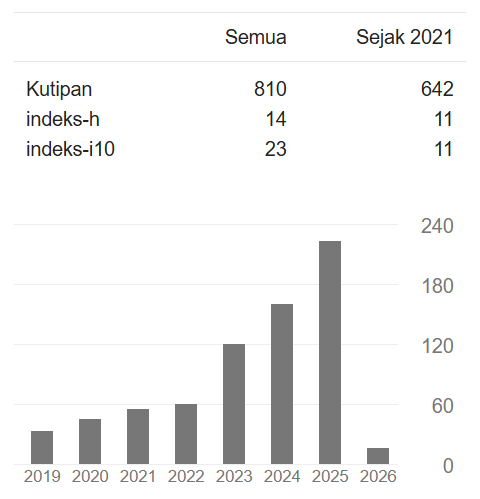HOMO DEUS
THE ISLAMIC CRITICAL APPROACH TO THE NEW AGENDA OF HUMANITY ACCORDING TO HARARI
DOI:
https://doi.org/10.20871/kpjipm.v10i2.367Keywords:
Happiness, Homo Deus, Islam, Modern Science, Yuval Noah HarariAbstract
This article discusses Islam and homo deus as a new agenda for humanity’s future. This article tries to explain the reading of homo deus and the problems of humanity in the future. Likewise, regarding the issue of immortality and human happiness in the future from an Islamic perspective. This article tries to analyze the problem using the library research model in carrying out an analysis of the main problem. Humans to fight death and the problems that humans expect in the future to maintain eternity feel like a god who will live eternally in the world. It is not only immortality in the world that modern humans will achieve, but how humans live in the world and gain happiness. True happiness is difficult for humans to obtain, even though humans use the discoveries of modern science. Humans will truly find happiness if they believe in and draw closer to God. The happiness that modern humans feel is only temporary pseudo-happiness. The immortality that modern humans desire is not directly proportional to happiness. This can be seen from the large number of people dying by suicide in various countries, the majority of which are advanced, and technology is developing rapidly, but it still cannot help their spiritual problems. Modern humans think that everything can be solved with the modern science they have discovered, even though there is God’s intervention in life in this world.
Downloads
References
Abdullah, Budi. 2018. “Konsep Manusia dalam Islam: Studi Terhadap Eksistensi Manusia.” Wahana Inovasi 7 (2): 73–84.
Afnan, Salsabila. 2020. “Corak Pemikiran Futurolog dalam Menghadapi Era Posthuman.” Skripsi, Sukoharjo: IAIN Surakarta. https://eprints.iain-surakarta.ac.id/655/.
Agung, Jiva. 2019. “Yuval Noah Harari’s View on The Challenges Of 21st Century Education.” Istoria: Jurnal Pendidikan dan Ilmu Sejarah 15 (2). https://doi.org/10.21831/istoria.v15i2.26230.
Bashir, Khairum. 2020. “Dampak Sains Dan Teknologi Terhadap Krisis Manusia Modern Menurut Yuval Noah Harari (1976-....).” Skripsi, Pekanbaru: Universitas Islam Negeri Sultan Syarif Kasim Riau. https://repository.uin-suska.ac.id/34868/.
D, Didiharyono, Buhari Fakkah, And Ovan Ovan. 2021. Integrasi Keilmuan Antara Sains & Teknologi dengan Agama (Suatu Konsepsi dalam Upaya Mengikis Dikotomi Ilmu). Makassar: Liyan Pustaka Ide Makassar.
Gündoğan, Saim. 2023. “Objections to Sam Harris’ Critic of Religion.” Ilahiyat Studies 14 (2): 439–67. https://doi.org/10.12730/is.1257476.
Harari, Yuval Noah. 2017. Sapiens: Riwayat Singkat Umat Manusia. Translated by Damaring Tyas Wulandari Palar. Jakarta: Kepustakaan Populer Gramedia.
———. 2018. Homo Deus: Masa Depan Umat Manusia. Translated by Yanto Musthofa. Jakarta: PT. Pustaka Alfabet.
Irawan, Dedy. 2019. “Tasawuf Sebagai Solusi Krisis Manusia Modern: Analisis Pemikiran Seyyed Hossein Nasr.” Tasfiyah: Jurnal Pemikiran Islam 3 (1): 41–66. https://doi.org/10.21111/tasfiyah.v3i1.2981.
Kristiatmo, Thomas. 2022. “Religious Liberty and Atheism: The Case of Richard Dawkins.” Melintas 38 (1): 47–59. https://doi.org/10.26593/mel.v38i1.7099.
Kuen, Mitha Mayestika, Hafied Cangara, And Hasrullah Hasrullah. 2022. “Analisis Homo Deus dalam Pandangan Harari Serta Fakta Kemajuan Teknologi di Era Society 5.0.” Al-Munzir 15 (1): 85–98. https://doi.org/10.31332/am.v15i1.3403.
Kulsum, Ummi. 2019. “Insan Kamil Sebagai Idealitas Muslim: (Perspektif Muhyiddin Ibn 'Arabi dan 'Abd Al Karim Al-Jilli).” Tafhim Al-’Ilmi 11 (1): 79–90. Https://Doi.Org/10.37459/Tafhim.V11i1.3556.
Lusi, Semuel S. 2020. “Resensi Buku Homo Deus: Implikasi Logis Dan Konsekuensi Tindaknya.” Kritis 29 (2): 169–83. https://doi.org/10.24246/kritis.v29i2p169-183.
Maulida, Syazna, And Suhermanto Ja’far. 2022. “Islam and Homo Deus in Anthropocentric Theology: A Religious Challenge in The Future.” Tajdid: Jurnal Ilmu Ushuluddin 21 (1): 108–24.
Nasr, Seyyed Hossein. 2013. Islam and the Plight of Modern Man. Tradition and Modernity: Christian and Muslim Perspectives. Vol. 2. London: ABC International Group.
Nguyễn Văn Thụ. 2023. “Quan Niệm Về Tôn Giáo Theo Lối Nhìn Của Yuval Noah Harari: The Concept of Religion from The Perspective of Yuval Noah Harari.” Khoa Học Công Giáo Và Đời Sống 3 (2): 104–10. https://doi.org/10.54855/csl.233212.
Prasetyono, Emanuel. 2013. “Manusia, Ilmu Pengetahuan dan Kesadaran Diri.” Jurnal Orientasi Baru 22 (2). https://e-journal.usd.ac.id/index.php/job/article/view/1146.
Rahardjo, M Dawam. 1987. Insân Kâmil: Konsepsi Manusia Menurut Islam. Jakarta: Grafitifers, 1987.
Razali, Wan Mohd Fazrul Azdi Bin Wan, And Mastura Binti Haji Abd Wahab. 2020. “Konsep Tuhan dan Agama dalam Metafizik Stephen Hawking (1942-2018) Menerusi Brief Answers to the Big Questions: Suatu Analisis dari Perspektif Islam.” In E-Proceedings of The International Conference on Aqidah, Religions and Social Sciences (Sigma10), 195–207. Malaysia: Universiti Sains Islam Malaysia.
Suryanti, Ch. 2010. “Agama dan Iptek: Refleksi dan Tantangannya dalam Mengembangkan Moralitas Kaum Muda.” Jurnal Orientasi Baru 19 (2): 155–70.
Verdino, Timotius. 2021. “Homo Deus: Manusia Masa Depan dalam Kajian Antropologi Teologis Berdasarkan Actor-Network-Theory dan Teologi Inkarnasi.” Thesis, Yogyakarta: Universitas Kristen Duta Wacana. https://katalog.ukdw.ac.id/6151/.
Zubair, A Charis. 1997. Etika Rekayasa Menurut Konsep Islam. Yogyakarta: Pustaka Pelajar.
Downloads
Published
How to Cite
Issue
Section
License
Copyright (c) 2024 Nur Azizah, Jauharul Habibi, Galuh Maria, Muhammad Aula Rahmad Shuhada

This work is licensed under a Creative Commons Attribution 4.0 International License.





























